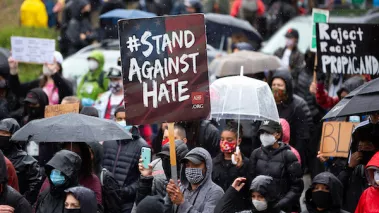 Is hate speech protected by the First Amendment" width="379" height="213" />
Is hate speech protected by the First Amendment" width="379" height="213" /> Is hate speech protected by the First Amendment" width="379" height="213" />
Is hate speech protected by the First Amendment" width="379" height="213" />
A recent survey from the Foundation for Individual Rights in Education found that a majority of Americans (57%) correctly recognize that the First Amendment protects hate speech from governmental regulation, punishment, or censorship — but 45% think that it should not be protected.
The First Amendment makes no general exception for offensive, repugnant, or hateful expression.
In Snyder v. Phelps, the United States Supreme Court protected in an 8-1 decision the hateful speech of the Westboro Baptist Church — known for picketing military funerals with signs that read “God hates fags” and “Thank God for dead soldiers” — during a 2006 protest near the funeral of Lance Corporal Matthew A. Snyder, a Marine killed in Iraq. Federal courts even protected the free speech rights of Nazis, who in 1977 were denied a permit to march through Skokie, Illinois, a village where many former Holocaust survivors lived. (Although the Nazis prevailed in court, the march actually never took place.)
The First Amendment makes no general exception for offensive, repugnant, or hateful expression.
As FIRE has explained many times before, speech by adults as free citizens does not lose First Amendment protection because it is considered hateful. This is because hate speech in and of itself is protected speech, particularly when spoken by adults on their own time.
Not all hate speech is protected by the First Amendment, since hateful expression can fall within certain, narrow categories of unprotected speech such as:
If the hateful speech falls within one of these unprotected categories, then it is not protected by the First Amendment. If it falls outside these categories, then the speech will remain protected by the First Amendment in most contexts, with a handful of other narrow exceptions for public employees and institutions. For example, a public employer can discipline a public employee, like a police officer or firefighter, who hurls a racist invective at a citizen while on duty. Likewise, a public grade school official can punish a student for maliciously yelling a racial slur at another student in the hallway. Officials at K-12 institutions may reasonably believe that such speech would cause a material and substantial disruption of school activities and interfere with the rights of others.
The First Amendment provides the greatest degree of protection to political speech, disallows discrimination against speech based on viewpoint, and generally prohibits the passage of vague or broad laws that impact speech. Laws must not sweep too broadly and must define key terms so that speakers know when their speech crosses the line into illegality.